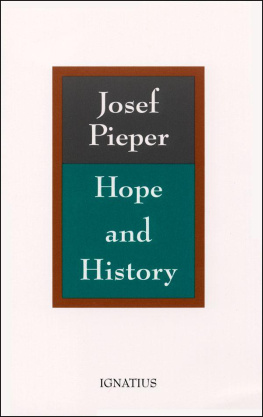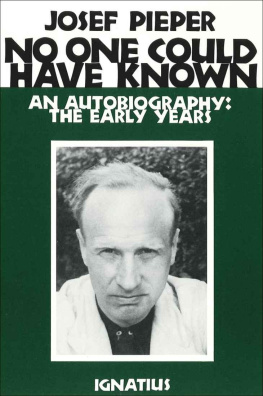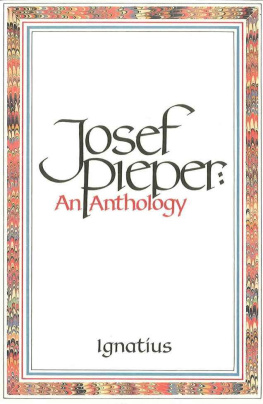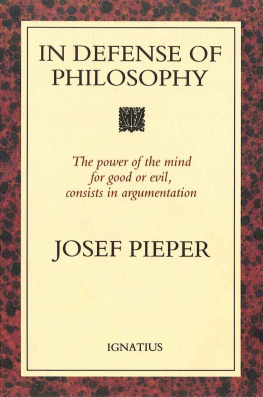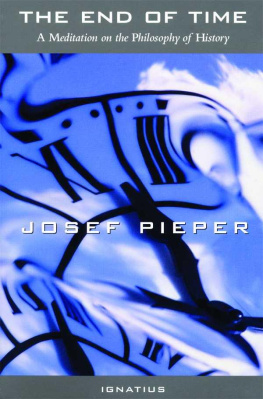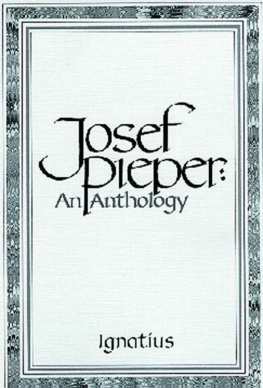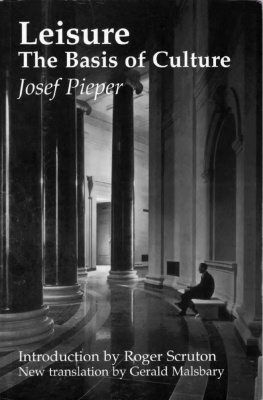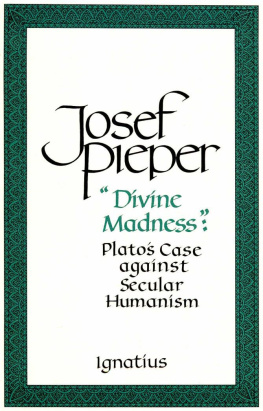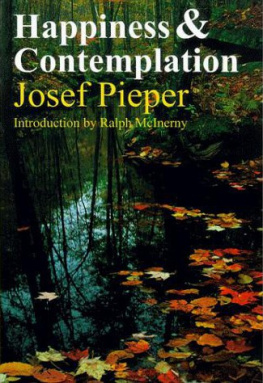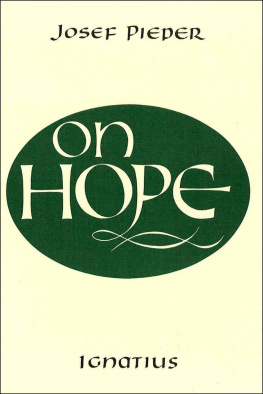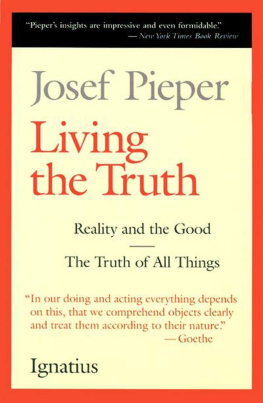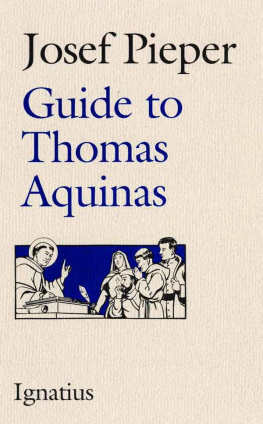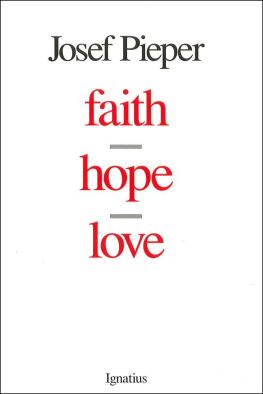Josef Pieper - Hope and History: Five Salzburg Lectures
Here you can read online Josef Pieper - Hope and History: Five Salzburg Lectures full text of the book (entire story) in english for free. Download pdf and epub, get meaning, cover and reviews about this ebook. year: 1994, publisher: Ignatius Press, genre: Romance novel. Description of the work, (preface) as well as reviews are available. Best literature library LitArk.com created for fans of good reading and offers a wide selection of genres:
Romance novel
Science fiction
Adventure
Detective
Science
History
Home and family
Prose
Art
Politics
Computer
Non-fiction
Religion
Business
Children
Humor
Choose a favorite category and find really read worthwhile books. Enjoy immersion in the world of imagination, feel the emotions of the characters or learn something new for yourself, make an fascinating discovery.
- Book:Hope and History: Five Salzburg Lectures
- Author:
- Publisher:Ignatius Press
- Genre:
- Year:1994
- Rating:3 / 5
- Favourites:Add to favourites
- Your mark:
- 60
- 1
- 2
- 3
- 4
- 5
Hope and History: Five Salzburg Lectures: summary, description and annotation
We offer to read an annotation, description, summary or preface (depends on what the author of the book "Hope and History: Five Salzburg Lectures" wrote himself). If you haven't found the necessary information about the book — write in the comments, we will try to find it.
Hope and History: Five Salzburg Lectures — read online for free the complete book (whole text) full work
Below is the text of the book, divided by pages. System saving the place of the last page read, allows you to conveniently read the book "Hope and History: Five Salzburg Lectures" online for free, without having to search again every time where you left off. Put a bookmark, and you can go to the page where you finished reading at any time.
Font size:
Interval:
Bookmark:
HOPE AND HISTORY
JOSEF PIEPER
Five Salzburg Lectures
Translated by Dr. David Kipp
IGNATIUS PRESS SAN FRANCISCO
Title of the German original:
Hoffnung und Geschichte:
Fnf Salzburger Vorlesungen
1967 Ksel-Verlag GmbH & Co., Munich
Cover by Roxanne Mei Lum
1994 Ignatius Press, San Francisco
All rights reserved
ISBN 978-0-89870-465-5
Library of Congress catalogue number 93-78535
Printed in the United States of America
QUI
MAGNI AD CONVIVII SPEM
ALACRIUS NOS PRCURRIT
DILECTO FILIO
PIAM IN MEMORIAM
For the first time: the new urgency of the question; The deceived wiser than the never deceived; Kant: What may I hope?; Interpretation of linguistic usage; The precipitous good that lies outside our control; The one object of hope per se; Fundamental hope and everyday hopes; Disappointment as enabling hope per se; Only he who hopes anticipates nothing
Historical and nonhistorical events; Freedom and decision; The hope of martyrs; Teilhard de Chardin and the confusion of evolution and history; A test case: evil; The temptation to resignation vis--vis history; Not a jungle but a mystery; The limits of speculation; The historical future and prophecy
The arguments of the idealistic philosophy of progress (Kant); Questionable visions of the future; Futile use of names of traditional concepts and loss of overall meaning structure; The angle of evolutionism (Konrad Lorenz); God has entrusted the world to their decisions; Teilhard de Chardin on the final state of the earth: two mutually exclusive hypothetical models; Strike in the intellectual-spiritual sphere and ecstasy of discord; The collapse of evolutionist thought and the admirable aspect of Teilhard de Chardin
Ernst Bloch and his encyclopedia of images of hope; What is nevertheless missing?; Misunderstanding about Gods other-worldliness; Realization of hope through socialist transformation of the world?; Ubi Lenin, ibi Jerusalem! ; The ignoring of death; Expectation of a golden age as consolation in the hereafter; The unanswerable question of legitimization (How do you know that?); Success of the plans worse than their failure?
Faiths challenge to revealed prophecy about history; Eschatology and apocalyptics; Everything becomes false if the believed total conception is wrong; No continuous progress up to fulfillment; Passing from time into eternity (Kant); Not simply the victory of reason; The lie made into the world order (Kafka); The last word of apocalyptic prophecy: New Heaven, New Earth; The Great Banquet and the spes implicita ; The non-specifiability of the object of hope
We seek the city that is to come.
Hebrews 13:14
The future alone is our objective.
Pascal
In the last decade of the eighteenth century, that is, the decade of the French Revolution, someone both raised and attempted to answer the question of whether the human race is constantly progressing toward the better. This someone was Immanuel Kant. His discussion of the matter takes a very fundamental approachnothing has been decided in advance, or at least so it seems. Considered quite abstractly, he says, there are obviously three possible answers to the question: (1) constant ascent, (2) continual decline, and (3) persistence at a given level, advancement on a more or less unvarying plane. Of these three possible answers, Kant finds that one can be immediately excluded, from the very start and without any discussion, namely, the second. Regression to the worse (as he expresses it) is, to be sure, an abstract possibility; but in concrete , there is no such thing; it is simply inconceivable to Kant. Why? The explanation provided here reads literally as follows: Decline toward the worse cannot be an ongoing constant in the human race, for at a certain stage in that process it would wipe itself out. But this possibility, the self-destruction of the human race, isaccording to Kanttotally out of the question in the context of realistic thought about history; such a thing can never happen.
Now, in the meantime (although, to be sure, only in the most recent past), a radical change has clearly occurred in relation to this point; fifty, or even just thirty, years ago, people could rightly believe themselves to share this conviction of Immanuel Kants. After Hiroshima, one can no longer do so. Since then, the idea that humanity could wipe itself out not only has become thinkable or merely discussable but is also of immediate urgency.
Looking back at this position of Immanuel Kants, one is reminded of Kierkegaards bitter maxim that the man who has been deceived is wiser than the one who has not. Also, one may perhaps find it unfair to argue about this matter, from the superior vantage point of the deceived, with a man of the eighteenth century, accusing Kant, for instance, of a deficiency of understanding or methodological exactitude. For at that time, the self-extermination of man was in fact beyond the realm of concrete possibility; it was, from a purely technical standpoint, something not realizable. Within the framework of his historical presuppositions, was Kant not, then, actually right? I would say that he had his good reasons but that he was not right. After all, the nature of historical man has not changed since then, indeed, not even since Adam (or Cain)! About the possibilities, including that of destruction, that are inherent in historical man; about what he can be deemed capable ofabout this it was undoubtedly easier for Kant to make a mistake than for us today; but it remains a mistake nonetheless, an error. Today, we are probably more susceptible to other sorts of error about man, but at least we are immune to this Kantian one. Confronting the three possible forms of the course of history that were formulated by Kant, we would be simply incapable of excluding the onethe negative onefrom the very start.
This is confirmed in countless ways by the cultural-critical, historical, philosophical, and sociological writings of recent decades as well as whenever an attempt is made to define the special position of this present age of ours. Today for the first time the existence of man is threatened, for the first time thus begins an address delivered at an international symposium of scholars in London (in 1962) on the future of man,
So here we encounter, with almost provocative effect, the first of the two basic terms that are conceptually linked in the subject of these lectures on hope and history. No matter what concrete implications might happen to follow from the question thus formulated, it is at least clear from the start that the mere linkage of these two concepts is of unparalleled relevance in our present-day situation. Here, too, we could speak of unprecedentedness for the first time ; never before, it seems, has it been possible to ask the question about the meaning and justification of human hope with such acute urgency. And yet, just what question, precisely, is at issue? That cannot, of course, be answered without first clarifying to some extent how hope and history are to be understood here.
~
What, then, is hope? As we know, Ernst Blochs great book Das Prinzip Hoffnung (The principle of hope) But the point need not be pursued here.
In any case, hope is something that can be empirically encountered and understood; this seemingly undeniable function of the human psyche presents itself continually to our experience. Consequently, those who reflect upon existence as a whole, that is, those who philosophize, cannot avoid focusing on hope as a phenomenon and discussing itdoing so, of course, in a philosophical way, which means from every conceivable viewpoint.
Next pageFont size:
Interval:
Bookmark:
Similar books «Hope and History: Five Salzburg Lectures»
Look at similar books to Hope and History: Five Salzburg Lectures. We have selected literature similar in name and meaning in the hope of providing readers with more options to find new, interesting, not yet read works.
Discussion, reviews of the book Hope and History: Five Salzburg Lectures and just readers' own opinions. Leave your comments, write what you think about the work, its meaning or the main characters. Specify what exactly you liked and what you didn't like, and why you think so.

